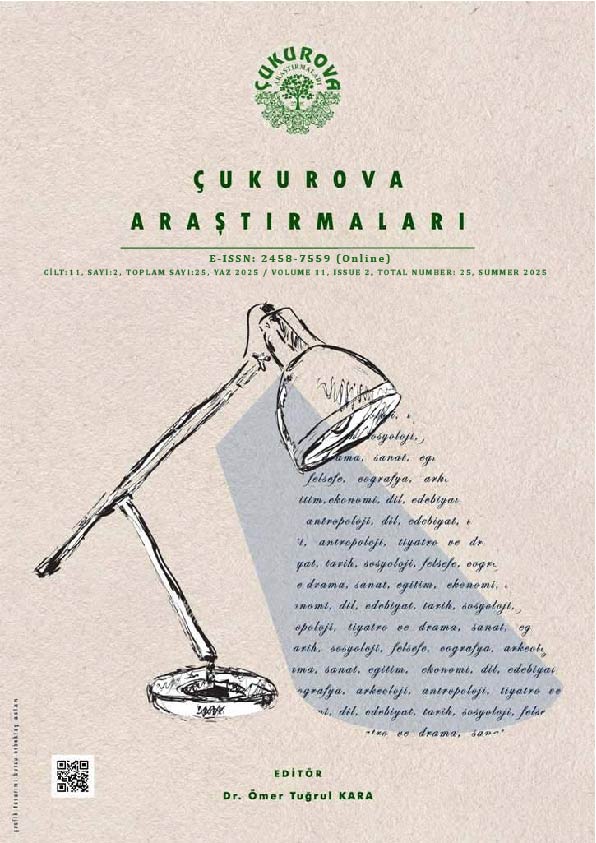Author :
Abstract
Söz varlığı, dildeki kelime ve ifadelerin tümünü içeren bir kavram olarak karşımıza çıkmaktadır. Nitekim söz varlığı Türk Dil Kurumu Güncel Türkçe Sözlüğü’nde “bir dildeki sözlerin bütünü; söz hazinesi, söz dağarcığı, sözcük hazinesi, kelime hazinesi, kelime kadrosu ve vakobüler” olarak tanımlanmaktadır. Bu tanımdan yola çıkarak bir dilin zenginliğini ve gücünü gösteren en önemli unsurlardan biri söz varlığıdır denilebilir. Dilin devamının sağlanması ise söz varlığının gelecek nesillere aktarılmasına bağlıdır. Söz varlığının genç nesillere aktarılmasının farklı yolları bulunmaktadır. Bu yollardan biri de öğrencilerin erken yaşta tanıştıkları ders kitaplarında bu unsurların bulunduğu metinler koymaktır. Buradan hareketle bu çalışmanın amacı, Maarif Modeli kapsamında yeni yayımlanan ve ilk defa 2024-2025 Eğitim Öğretim Yılı’nda 5. sınıf seviyesinde kullanılmaya başlanan Türkçe ders kitabında yer alan 24 okuma metnindeki söz varlığı unsurlarını incelemektir. Söz varlığı unsuru olarak atasözleri, deyimler, ikilemeler, terimler, kalıp sözler, yansıma sözcükler, yabancı sözcükler, argo sözler, kalıplaşmış sözcükler ve doldurma sözler biçiminde bir tasnif kullanılmıştır. Çalışmada nitel araştırma yöntemlerinden doküman analizi metodu kullanılmış, verilerin analizinde içerik analizi tekniğine başvurulmuştur. İnceleme sonucunda okuma metinlerinde en fazla terim anlamlı sözcüklere ve deyimlere rastlandığı tespit edilmiştir. Bu durum neticesinde, söz varlığının aktarımında ders kitaplarının rolü yadsınamaz. Ancak, verimli bir dil eğitimi için metinlerdeki söz varlığı çeşitliliğinin artırılması, kültürel mirasın korunması ve öğrencilerin iletişim becerilerinin geliştirilmesi açısından kritik öneme sahiptir.
Keywords
Abstract
Vocabulary is a concept that includes all words and expressions in a language. In fact, vocabulary is defined in the Turkish Language Association Current Turkish Dictionary as “the totality of words in a language; vocabulary, lexis, vocabularies, word pool, word pool and vacuoles”. Based on this definition, it can be said that vocabulary is one of the most important elements that show the richness and power of a language. The continuation of the language depends on the transfer of vocabulary to future generations. There are different ways to transfer vocabulary to young generations. One of these ways is to include texts containing these elements in the textbooks that students are introduced to at an early age. Based on this, the aim of this study is to examine the vocabulary elements in 24 reading texts in the Turkish textbook, which was newly published within the scope of the Maarif Model and was first used at the 5th grade level in the 2024-2025 Academic Year. As a vocabulary element, a classification was used in the form of proverbs, idioms, reduplications, terms, formulaic words, onomatopoeia, foreign words, slang words, formulaic words and filler words. In the study, the document analysis method, which is one of the qualitative research methods, was used, and the content analysis technique was used in the analysis of the data. As a result of the examination, it was determined that the most frequently encountered words with meaningful meanings in the reading texts were terms and idioms. As a result of this situation, the role of textbooks in the transfer of vocabulary cannot be denied. However, for an efficient language education, increasing the variety of vocabulary in texts is of critical importance in terms of preserving the cultural heritage and developing the communication skills of the students.





